You’ve probably heard the term “superfoods” used more and more over the last few years.
Superfoods are considered to be any food that’s especially good for our health, providing additional nutrients that can potentially reduce the risk of certain diseases.
You may already include some of these foods (such as berries, kale, fatty fish and lentils) in your diet. But there’s a superfood full of health benefits that you might not be as familiar with.
What Is Unpasteurised Sauerkraut?
Unpasteurised sauerkraut is made by a process called lacto-fermentation.
Like all vegetables, cabbage has beneficial bacteria found on the surface. When submerged in brine, the good bacteria convert sugars in the cabbage into lactic acid, and the harmful bacteria are wiped out by the salt.
The fermentation process creates conditions that are perfect for the growth of helpful probiotics (live bacteria and yeasts that are beneficial to our health).
If heat is applied to the cabbage, the beneficial bacteria created by the fermentation process are destroyed. This results in pasteurised sauerkraut.
The Origins of Sauerkraut
Sauerkraut has been around a long time, and the origins of this food can be traced back to labourers building the Great Wall of China over 2,000 years ago, who began fermenting shredded cabbage as a food source that could be stored throughout winter.
Ghenghis Khan brought it to Europe 1,000 years later, and the Germans named it sauerkraut (which translates to “sour cabbage”).
Where to Buy Unpasteurised Sauerkraut in the UK
1. Abel & Cole
Abel & Cole have been selling organic fruit and vegetable boxes for nearly 30 years, and they now sell organic, unpasteurised sauerkraut in 520 g bags online.
This sauerkraut is made by organic food brand Profusion, and is perfect to add to salads, or to eat as a side dish. This sauerkraut will need to be stored in a fridge and consumed within 3 days.
2. The Sauerkraut Company
The Sauerkraut Company’s award-winning barrel-aged Traditional Sauerkraut can be bought in 500g jars and will last 10-15 days in the fridge once opened.
This crunchy, zingy sauerkraut is made traditionally with no chemicals, additives or preservatives, and simply contains white cabbage and mineral-rich Himalayan pink salt.
You’ll find other interesting variations of unpasteurized sauerkraut on their website which can include beetroot, red cabbage, turmeric or caraway seeds.
They also have sauerkraut juice which is manually squeezed from traditional sauerkraut. It has no vinegar and no added water.
All their vegetables are sourced locally from suppliers who follow environment and animal friendly policies.
Basic shipping is included with all products but if you’d like to receive your package faster, add the FedEx option to your basket.
3. PAMA
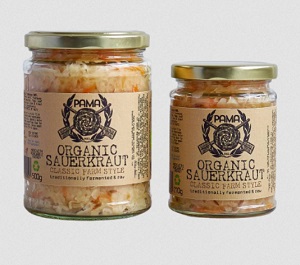
PAMA sells Organic Classic Farm Style Sauerkraut in small (270g) and big (500g) sizes. They use organic and local ingredients and the sauerkraut is traditionally fermented in barrels for at least 5 weeks
Once opened, the sauerkraut should be refrigerated and consumed within 10-14 days.
If you find a white film appearing, it is harmless yeasts formed due to air, you can simply skim it off.
One of the most unique things about PAMA is that they use extremely pure and chemical free salt. They get their salt from Luisenhall, the last deep salt pan in operation in Europe.
Apart from the classic farm style Sauerkraut, they have multiple varieties and flavours including a turmeric infused ayurvedic variety with black pepper and cayenne.
They plant 2 trees for every order. The shipping charges for ordering through their websites are additional.
4. Loving Foods
Loving Foods are certified as an organic manufacturer by the Organic Food Federation, and the company never heat treat any of their products so that all of the beneficial bacteria and nutrients remain.
Loving foods sells a wide range of organic unpasteurised sauerkraut. You can try interesting varieties such as caraway and juniper berry, winter warmer (made with red cabbage) and Spanish-style cortido flavour (with added red chillies, carrot and oregano).
Each variety is organic, raw and unpasteurised, and made in the UK from locally sourced ingredients. Even their packaging is 100% recyclable.
The website also has lots of interesting serving suggestions and recipe ideas using sauerkraut.
They also sell different flavours of raw, organic and unpasteurized sauerkraut juice which is good for your gut.
5. Ocado
Online supermarket Ocado stocks Organic Fresh Sauerkraut by RAW, which is unpasteurised. Each pack contains 410 g of unpasteurised sauerkraut in a recyclable tub.
This smaller sized tub might suit smaller households, but you will still need to eat it within 3 days of opening.
They also sell fennel, apple and dill flavoured unpasteurized sauerkraut by The Cultured Collective.
Ocado charges for delivery, so you might want to add this sauerkraut to the rest of your online grocery shop rather than ordering it individually.
6. Amazon
The Cultured Food Company sells small (400g) and large (1kg) packs of raw, organic and unpasteurised sauerkraut on Amazon.
Apart from the classic type, they have a variety of flavours too – Carrot and fennel (good for digestion), Ruby red (infused with cumin seeds), Juniper berry, and Chilli and dill.
You can also buy unpasteurised sauerkraut by Loving Foods, The Sauerkraut company and RAW on Amazon.
7. Planet Organic
Planet Organic is a one-stop shop for organic groceries. They sell Morgiel’s unpasteurised and organic sauerkraut (300g) which is traditionally fermented in small batches.
They also stock the unpasteurised sauerkraut by RAW, Profusion and The Cultured Collective (mentioned above).
Planet Organic offers both standard and next day delivery.
Can You Buy Unpasteurised Sauerkraut in Supermarkets?
It’s currently quite difficult to buy unpasteurised sauerkraut in most of the main supermarkets in the UK, and if you do find sauerkraut in a supermarket it’s likely to be pasteurised.
High street health food store Holland and Barrett don’t currently sell unpasteurised sauerkraut, although they do sell Biona Organic Kimchi, also made from fermented cabbage. Biona is an organic company here in the UK. Unfortunately it is not unpasteurised.
Tesco also sells Biona Organic Kimchi and also Biona Organic Sauerkraut. Unfortunately, Aldi do not. Other supermarket options are Sainsbury’s who sell sauerkraut, but not the unpasteurised variety.
Health Benefits of Unpasteurised Sauerkraut
Eating unpasteurised sauerkraut has numerous health benefits, including improving digestion and boosting immunity.
It’s important to eat the unpasteurised variety of sauerkraut to really benefit your health.
Canned, pasteurised sauerkraut might be easier to find in a supermarket, but the beneficial bacteria produced during the lacto-fermentation process are killed during pasteurisation, along with other nutrients such as Vitamin C.
Here are just a few of the benefits of eating unpasteurised sauerkraut:
- Boosts immune system – Unpasteurised sauerkraut is excellent for boosting immunity. When we eat probiotics, we help keep the lining of our stomach and digestive system healthy, preventing harmful substances leaking into our body causing an immune response.
Unpasteurised sauerkraut is also rich in other vitamins and minerals such as vitamin C, so it can help prevent you catching common colds, or help you recover more quickly if you do catch one. - Source of probiotics – Probiotics are particularly helpful to restore health to your digestive system after an upset stomach, or after a course of antibiotics which may have caused tummy problems.
- Could improve brain health – The health of our brain is also linked to our digestive system. Probiotics have been linked to improvements in memory, and can be helpful in those suffering from anxiety and depression.
Scientists are currently researching the link between healthy gut bacteria and long-term mental health, including how “probiotics from cultured foods such as sauerkraut may reduce your risk of conditions such as depression and Alzheimer’s”.
However, anyone taking monoamine oxidase inhibitors (MAOIs) to treat conditions such as depression and Parkinson’s disease should check with their doctor before eating sauerkraut, as compounds found in sauerkraut can interfere with this type of medication. - Could help control weight – Eating unpasteurised sauerkraut can help you lose weight. As well as being low in calories and high in fibre to keep you feeling full, studies have also show that eating probiotics helps prevent your body from absorbing as much fat.
- Could lower cholesterol – Probiotics found in unpasteurised sauerkraut can help to lower levels of harmful cholesterol.
- Could help prevent cancer – Unpasteurised sauerkraut contains antioxidants and other beneficial plant compounds (such as dithiothiones, indoles and sulfur), which may be useful for cancer prevention.
Several studies have shown that cabbage and sauerkraut can reduce carcinogen-activating enzymes which may lead to cancer, and other studies have shown that “women who ate a lot of cabbage and sauerkraut from their teens into adulthood had a reduced risk of breast cancer.” (source)
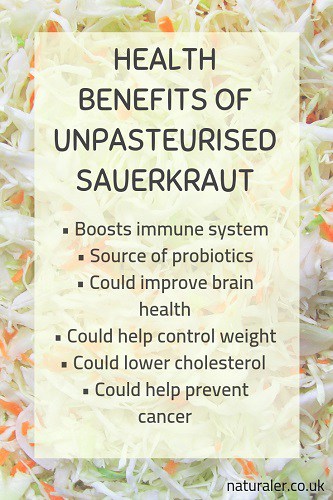
Making Your Own Sauerkraut
If you’re struggling to buy unpasteurised sauerkraut, you can always try making it yourself. Making your own sauerkraut is surprisingly easy and cost-effective too.
You’ll need:
1 medium white or red cabbage
1-3 tbsp. sea salt
Spring or distilled water (tap water may be too hard)
Method:
- Wash the cabbage and remove the outer leaves.
- Using a large knife, chop or shred cabbage and place in a large bowl. Sprinkle with the salt.
- Using tongs, a potato masher or clean hands, knead the cabbage until it starts to break down from the salt and there is enough liquid to cover.
- Transfer the broken-down cabbage to a clean glass jar, pressing the cabbage underneath the liquid using a wooden spoon. Add a little extra water if required.
- The cabbage near the surface of the liquid tends to float, so place a large outer leaf of cabbage over the surface of the shredded cabbage to hold it down under the liquid during the fermentation process. Or you can try using a jar with a tight, airlock lid (release excess pressure daily if using this method).
- Culture at room temperature for around 2 weeks.
- Once the sauerkraut is ready, put a tight lid on the jar and move to the fridge to store.

Clare began her career as a technical writer, but since having her boys has worked mostly from home writing content for various websites, including health and beauty and educational resource sites.

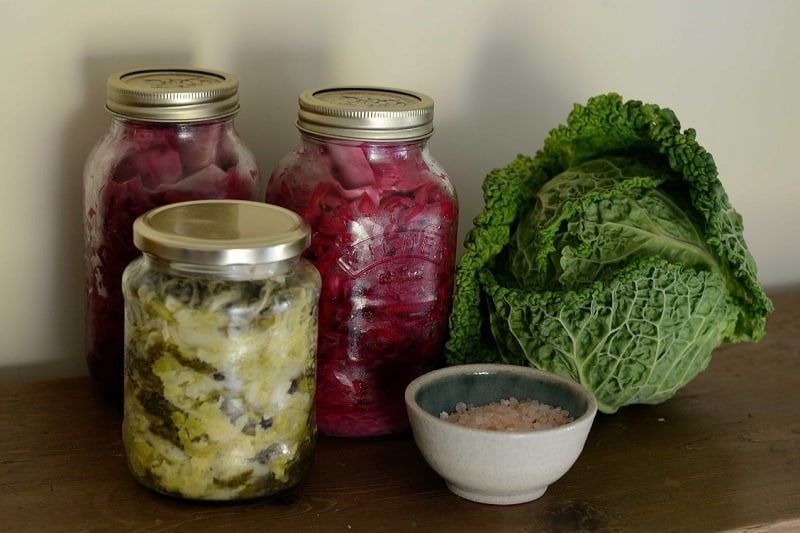
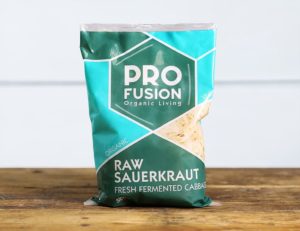
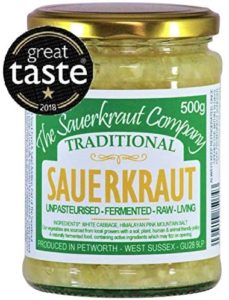
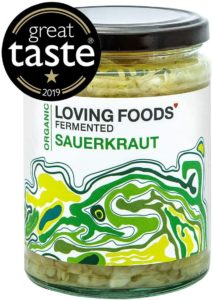
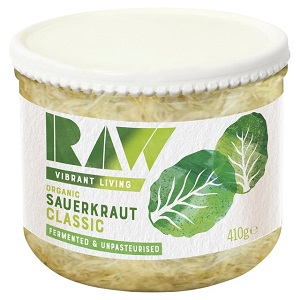

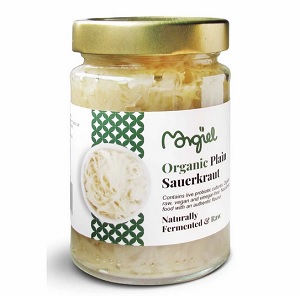


Thank you for this. It’s very helpful and seems so simple to make but I’m weary of contamination and was hoping you could advise where I can buy the raw unpastuerised type.
I have just began eating Sauerkrut a few days ago having discovered what an excellent food it is for health.
Currently, I use Biona organic pasteurized, infused with juniper berries, in salt.
Could you advise if this is of any benefit in it’s state, to help with gut health?
I am quite desperate as this has been recommended for my health condition and so, I’m hoping I’m receiving at least some health benefits from this product.
The best place to find unpasteurised sauerkraut is in Polish/eastern European grocery shops. Sauerkraut is even more common in Poland that in Germany and in those shops you can find organic fresh and live sauerkraut (that you must keep in the fridge), the paper pack has little valve so it can breath. And it’s cheaper as well. Avoid Amazon if you can!
Very helpful, thanks. One idea I’ve tried is to pour a layer of extra virgin olive oil over the surface of the maturing sauerkraut, which stops the air getting to the contents (like the ancient Greeks and Romans used to do for maturing and storing wine in urns) . You can still mix up the contents, as the oil simply returns to the surface afterwards to resume protection. This extends the best before date almost indefinitely…none of the “eat within 3 days of opening”.
Found this reall interesting. Only recently started eating Sauerkraut . Think I’ll start making my own.
Thank you.
You can buy raw unfermented sauerkraut and kimchi from Waitrose